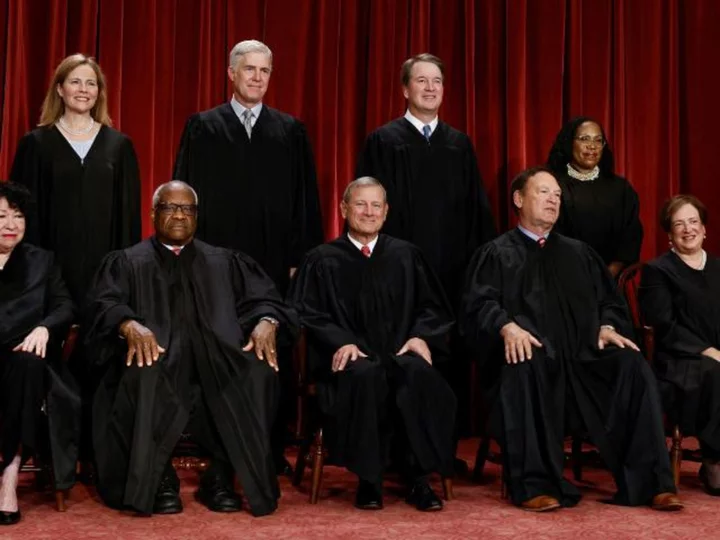All eyes are on the Supreme Court for its final week, as the justices will release cases on issues such as affirmative action, student loan payments, election law and LGBTQ rights.
Of the 10 cases remaining, several that most capture the public's attention are likely to lead to fiery opinions and dissents read from the bench.
In addition, they will come down as the court finds itself in the center of a spotlight usually reserved for members of the political branches due to allegations that the justices are not transparent enough when it comes to their ethics disclosures, most recently with Justice Samuel Alito last week.
Here are some of the remaining cases to be decided:
Affirmative action in college admissions
The court is considering whether colleges and universities can continue to take race into consideration as a factor in admissions, a decision that could overturn long standing precedent that has benefited Black and Latino students.
At issue are programs at Harvard and the University of North Carolina that the schools say help them to achieve diversity on campus.
During oral arguments, the right side of the bench appeared ready to rule against the schools. Such an opinion would deliver a long-sought victory for opponents of affirmative action in higher education who have argued for decades that taking race into consideration -- even in a limited manner -- thwarts the goal of achieving a color-blind society.
Can businesses deny services to LGBTQ customers?
At the center of another case is a graphic designer, Lorie Smith, who seeks to expand her business and create custom websites to celebrate weddings -- but does not want to work with gay couples out of religious objections to same-sex marriage.
Smith has not yet moved forward with her new business venture because of Colorado's public accommodations law. Under the law, a business may not refuse to serve individuals because of their sexual orientation. Smith, whose company is called 303 Creative LLC, said that she is willing to work with all people, regardless of their sexual orientation, but she draws the line at creating websites that celebrate same-sex marriage because expressing such a message would be inconsistent with her beliefs.
The state and supporters of LGBTQ rights say that Smith is simply seeking a license to discriminate.
The conservatives on the court were sympathetic at oral arguments to those put forward by Smith's lawyer. They viewed the case through the lens of free speech and suggested that an artist or someone creating a customized product could not be forced by the government to express a message that violates her religious beliefs.
Giving state lawmakers unchecked power over federal elections
Moore v. Harper has captured the nation's attention because Republican lawmakers in North Carolina are asking the justices to adopt a long dormant legal theory and hold that state courts and other state entities have a limited role in reviewing election rules established by state legislatures when it comes to federal elections.
The doctrine -- called the Independent State Legislature theory -- was pushed by conservatives and supporters of Trump after the 2020 presidential election.
The North Carolina controversy arose after the state Supreme Court struck down the state's 2022 congressional map as an illegal partisan gerrymander, replacing it with court-drawn maps that favored Democrats. GOP lawmakers appealed the decision to the US Supreme Court, arguing that the North Carolina Supreme Court had exceeded its authority.
They relied upon the Elections Clause of the Constitution that provides that rules governing the "manner of holding Elections for Senators and Representatives" must be prescribed in "each state by the legislature thereof."
Under the independent state legislature theory, the lawmakers argued, state legislatures should be able to set rules with little to no interference from the state courts.
The justices heard oral arguments in the case last winter and some of them appeared to express some support for a version of the doctrine. The justices could, however, ultimately dismiss the dispute due to new partisan developments in North Carolina.
After the last election, the North Carolina Supreme Court flipped its majority to Republican. In April, the newly composed state Supreme Court reversed its earlier decision and held that the state constitution gives states no role to play in policing partisan gerrymandering. After that decision was issued, the justices signaled they may dismiss the case.
Biden's student loan program
The Supreme Court is also considering two challenges to President Joe Biden's student loan forgiveness program, an initiative aimed at providing targeted debt relief to millions of student-loan borrowers that has so far been stalled by legal challenges.
Republican-led states and conservatives challenging the program say it amounts to an unlawful attempt to erase an estimated $430 billion of federal student loan debt under the guise of the pandemic.
At the heart of the case is the Department of Education's authority to forgive the loans. Several of the conservative justices have signaled in recent years that agencies -- with no direct accountability to the public -- have become too powerful, upsetting the separation of powers.
They have moved to cut back on the so-called administrative state.
In court, Chief Justice John Roberts as well as some other conservatives seemed deeply skeptical of the Biden administration's plan.
Religious accommodation for postal worker
A former mail carrier, an evangelical Christian, seeks to sue the US Postal Service because it failed to accommodate his request not to work on Sundays.
A lower court had ruled against the worker, Gerald Groff, holding that his request would cause an "undue burden" on the USPS and lead to low morale at the workplace when other employees had to pick up his shifts.
There appeared to be consensus, after almost two hours of oral arguments, that the appeals court had been too quick to rule against Groff.

